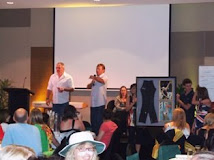10 Points on How to Run A Successful Auction!
1. Because your auction is of a specific nature it is imperative to select an auctioneer that is ideally suited to this type of Auction. For example, a Fine Art Auctioneer is not always the person to select when conducting a charity auction which may include sporting memorabilia and assorted items that have been donated.
The success of your auction often depends on the ability of the auctioneer and his knowledge of the type of goods being submitted to auction. The hype and spontaneous activity that comes with these types of auctions requires certain qualities such as a quick wit, an ability to “get on with it” and sell for extended periods at a fast pace. Alternatively, more refined auctions such as Fine Art calls for an auctioneer that displays a good level of patience and decorum. Selection of the most suitable auctioneer is sometimes understated and many auctions fail to reach the desired results and standards because of poor selection.
2. Much credence should be given to the selection of the Auction venue when organising your auction. The venue should reflect the quality and type of auction being held in order to achieve your maximum result. When conducting an auction it is often difficult to judge the projected size of the crowd and therefore the crowd catering in relation to seating and general hospitality is dependant on these factors. It is very important that potential purchasers have the necessary access to auction items in order to ascertain their value and suitability to their needs. Special emphasis should be placed on the venue because too much room or too little room at the wrong venue will be counterproductive to the success of the auction.
3. Sufficient advertising and promotion of your auction is absolutely critical to it’s success. Select the best possible advertising mediums to expose your specific auction and attempt to reach the target market by way of these mediums. Very careful consideration needs to be given to the target market when deciding on the most suitable advertising campaign. Depending on the type of auction, the time and value of the campaign can vary quite substantially but it is important not to under expose the auction if you wish to maximise the financial result. Having a strong, qualified crowd of buyers goes a long way towards success.
4. Ensuring that sufficient, trained staff are engaged to assist in all facets of the auction process is very important. The presence of relevant staff members in areas of registration, presentation of items, acceptance and delivery of auction items etc is a critical component of a successful auction.
5. When conducting an auction of any type it is imperative that the auction items are presented to the public in the best possible condition. In an ever increasing competitive world, pristine presentation will strongly enhance a seller’s chances of achieving a good price for their auction items. Attention to detail in presentation is sure to be rewarding
.
6. An important part of the auction process is to provide a number of payment options to satisfy the needs of the buying public. These days acceptable methods of payment at the most auctions are cash, personal cheque, bank cheque and various forms of credit card options. Auction items will normally remain on site until full payment is received unless alternative arrangements are made prior to auction. It is important for the auctioneer to make everyone aware of auction payment conditions prior to commencement of the auction.
7. To continue the smooth operation of the auction process it is important that buyers are able to take delivery of their auction purchases with a minimum of fuss. Trained staff will assist with efficient delivery of items once payment has been made. Safe delivery is an important part of the process.
8. Re-enforce the absolute necessity to receive full payment for auction items prior to collection by buyers. Failure to enforce the payment policy can be a financial disaster. History tells us that a soft approach in this area of the auction process often leads to moral and financial disappointment.
9. When formalising an agreement with an auctioneer it is important to discuss the financial settlement arrangements once the auction is completed. Once again, depending on the type of auction being conducted, the auctioneer (or his agency) will collect the auction proceeds and, in turn, dispurse the proceeds to the relevant recipients. Normal deductions prior to release of funds to the seller will include Agents Commission and Advertising.





